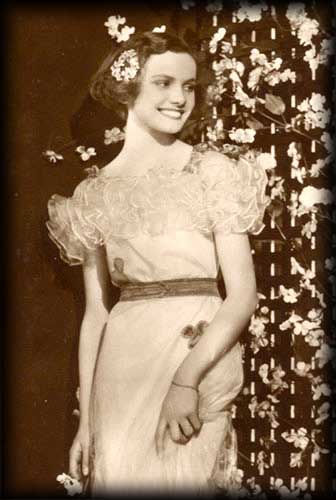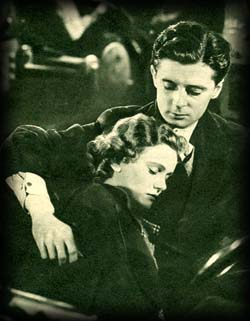
|
Nova Pilbeam Biography (1937-1941) by Carole Due to overexpansion and the inability to pentrate the American market, Gaumont British collapsed in 1937. Nova's new film, Alfred Hitchcock's "Young and Innocent" moved from Lime Grove to Pinewood under the Gainsborough banner. This is the most frequently revived of her films and the one most new admirers discover her in. The story of an unjustly accused man helped by the chief constable's daughter, it's a delightful lighthearted chase tale and Nova and Derrick De Marney are ideal screen partners. It seemed that Nova would make a seamless transition to adult stardom. However the Gaumont British collapse meant that there was no support to build her film career at a crucial moment. She was considered for the lead in "The Lady Vanishes", but Margaret Lockwood was cast and Pilbeam did not make another film for two years.
|
|
Her film contract lapsed, her only important work in 1938 was a reprise of
"Peter Pan" in the West End, following the late withdrawal of its usual star Jean
Forbes-Robertson. However behind the scenes, David O Selznick was in pursuit.
He had been intrigued and excited by "Young and Innocent" and was convinced
Pilbeam was perfect for the lead in "Rebecca" and could be turned into a world
star with the correct handling. Hitchcock had conceived "Rebecca" in vastly
different terms than the book and balked. Selznick was not discouraged and asked
his London agent to find out if Nova wished to try Hollywood and it transpired
that she did, but her agent was worried by the proposed five year contract with
its exclusivity clauses. Hitchcock continued to contend that Pilbeam was too
immature for the part and ultimately Selznick abandoned his pursuit. Interviewed
in 1990, it was apparent that she knew of the "Rebecca" opportunity, but thought
that Hitchcock wanted her and Selznick did not!
In 1939 Nova made a foray into early television in "Prison Without Bars" about a young woman in a reformatory who falls in love with the institution's doctor. Presumably live and unrecorded, it is regrettable that it was not made into a film as it sounds more challenging than most of her adult film work. 1939 also saw her return to films in "Cheer Boys Cheer" an Ealing production co-starring Edmund Gwenn, about the rivalry between two breweries, one traditional and one modern. Cited as a precursor to the Ealing comedy tradition of the late 1940's, Pilbeam was very sophisticated in an almost screwball role. Shortly after the commencement of the Second World War, Nova announced her engagement to fledgling film director Pen Tennyson, seven years her senior. They had first met when he was Hitchcock's assistant director on "The Man Who Knew Too Much". The couple were married on a very rainy day at Caxton Hall in London on 19th October 1939 and honeymooned in Devon.
She made another film in 1940, "Spring Meeting" opposite Michael Wilding, which she remembered as lovely. Unfortunately this has not been revived for at least twenty years. Pen took up a long deferred commission in the Navy in June 1940 following the completion of his third film "Convoy". Nova allegedly helped him to learn signalling by sitting opposite him sending highly unnautical messages in morse! She also put her career on virtual hold for a year to be available to visit him when he had leave or to stay with him when he had a shore posting, as he did from December 1940 when he joined the Admiralty's instructional film unit. In July 1941, Pen was filming at Scapa in Scotland. On 7th July he sent Nova the following telegram: "Will be with you tomorrow evening - cheers". On 11th July the following headline appeared in the Daily Mail, "Husband of Nova Pilbeam Killed". The plane he had taken to Rosyth, where he was to catch the mail plane to London, had crashed an hour after the telegram had been sent. Nova was only twenty one years old. She returned to work. She was the glamourous juvenile lead in "Banana Ridge", a farce with Robertson Hare and appeared in two plays at Kew's Q theatre, "School for Slavery" in November and J M Barrie's "A Kiss for Cinderella" at Christmas.
|
|
Next Part of the Biography - 1942 Onwards
Previous Part of the Biography - Early Years - 1919-1936
Nova Pilbeam Biography - Top Page
Nova Pilbeam - Top Page
Back to the Wickedlady Films Top Page
All text © Copyright 2001 wickedlady.com.
May not be reused or reproduced in any shape or form without permission of the copyright holder.
 On their return, Nova did a radio broadcast of "Romeo and Juliet", played Viola in
Twelfth Night at Oxford and started work at Twickenham Studios in "Pastor Hall", a
serious "Horror of the Nazis" picture by the Boulting Brothers. Nova plays the
daughter of a German Pastor who denounces the Nazi regime from his pulpit. It's
a strong film which includes a pro abortion argument, but unfortunately, on its
release in May 1940 it was ignored by audiences turned off by war stories.
On their return, Nova did a radio broadcast of "Romeo and Juliet", played Viola in
Twelfth Night at Oxford and started work at Twickenham Studios in "Pastor Hall", a
serious "Horror of the Nazis" picture by the Boulting Brothers. Nova plays the
daughter of a German Pastor who denounces the Nazi regime from his pulpit. It's
a strong film which includes a pro abortion argument, but unfortunately, on its
release in May 1940 it was ignored by audiences turned off by war stories.